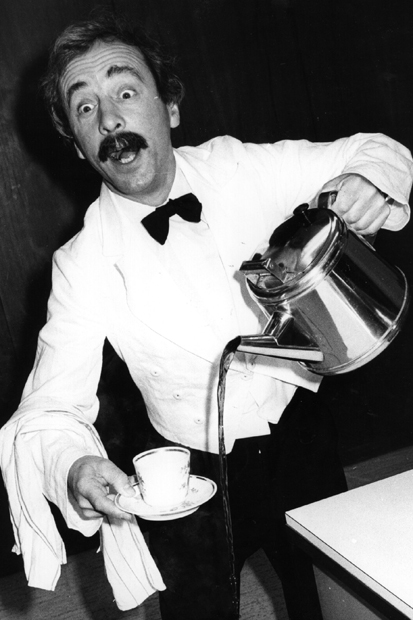Comedians always like to claim that they started making jokes after childhoods made harsh by poverty; that at a formative age they were tormented by appalling cruelty and neglect. Griff Rhys Jones had to leave Wales at the age of six days, for instance. Nevertheless, the Chaplin family could afford a maid in Kennington. The Leeds of Alan Bennett and the Morecambe of Victoria Wood always sound cosy — as does the Hadley Wood of Eric Morecambe; and there was not much wrong with Barry Humphries’s salubrious Melbourne, though I concede it has been knocked flat by ‘developers’ since. But with Andrew Sachs the horrors were very real. Aged eight, ‘I stood open-mouthed as a number of men, wielding wooden clubs, shattered the front of a shoe shop. It was 9 November 1938. Kristallnacht.’
Sachs was born in Berlin, with a Jewish father and a Catholic mother. Dr Hans Sachs was a decorated Great War veteran, ‘of solid-gold Prussian ancestry’. This now counted for nothing. He was a distinguished lawyer, but work dried up: ‘Long-standing clients found it necessary to take their business elsewhere.’ On top of which, a 20 per cent tax was levied on Jewish property. Sachs’s mother’s jewellery was confiscated. The family was humiliatingly thrown out of their favourite restaurant and harassed generally: ‘Jewish patronage was no longer welcome.’ Insult was added to injury when a ‘collective fine of one billion marks was levied on Jews to pay for the damage’ caused by all the Nazi vandalism.
The Sachs’s were fortunate to have the wherewithal to escape — Jews wanting to leave the Reich had to purchase expensive permits and exit visas. Hans ‘packed his bags and saved his life’, and the rest of the family followed shortly afterwards, abandoning their apartment and heirloom furniture. Bourgeois comfort was exchanged for refugee status in Hatch End.
Andrew vividly recalls his first sight of the London populace — characters straight out of Hogarth or Cruikshank engravings, ‘displaying unsightly blemishes and bandy legs, embarrassing acne, cold sores, moles, boils, crusty warts and false teeth that clattered’.








Comments
Join the debate for just £1 a month
Be part of the conversation with other Spectator readers by getting your first three months for £3.
UNLOCK ACCESS Just £1 a monthAlready a subscriber? Log in